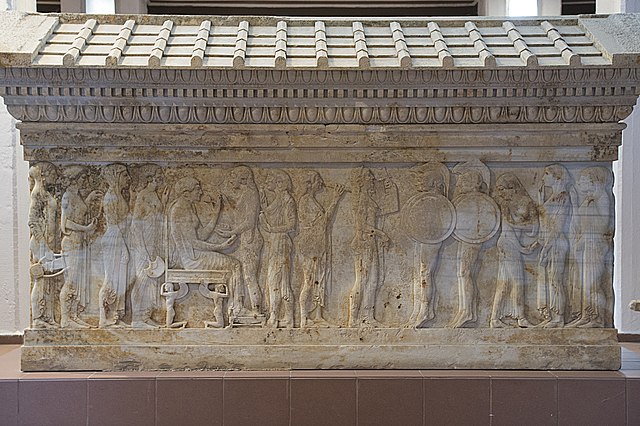Achilles on Skyros is an episode in the myth of Achilles, a Greek hero of the Trojan War. Not existing in Homer's epic poem Iliad, the episode is written down in detail in some later versions of the story, particularly the Achilleid by the Roman poet Statius. The story of how Achilles disguised himself as a girl at the court of the king of Skyros, fell in love with one of the princesses, and married her before leaving for Troy, became a popular topic in arts and literature from Classical times until the middle of the 20th century. The carnivalesque disguises and gender transpositions at the heart of the story were particularly popular in opera, with over 30 different operas on the theme between 1641 and 1857.
Fresco from the House of the Dioscuri in Pompeii depicting Achilles between Diomedes and Odysseus at Scyros
Achilles Discovered among the Daughters of Lycomedes was the usual moment shown in art, here by Gérard de Lairesse
A Roman mosaic from the Poseidon Villa in Zeugma, Commagene (now in the Zeugma Mosaic Museum) depicting Achilles disguised as a woman and Odysseus tricking him into revealing himself
Achilles on Skyros, 1656 painting by Nicolas Poussin, now in the Virginia Museum of Fine Arts
The Trojan War was a legendary conflict in Greek mythology that took place around the 12th or 13th century BCE. The war was waged by the Achaeans (Greeks) against the city of Troy after Paris of Troy took Helen from her husband Menelaus, king of Sparta. The war is one of the most important events in Greek mythology, and it has been narrated through many works of Greek literature, most notably Homer's Iliad. The core of the Iliad describes a period of four days and two nights in the tenth year of the decade-long siege of Troy; the Odyssey describes the journey home of Odysseus, one of the war's heroes. Other parts of the war are described in a cycle of epic poems, which have survived through fragments. Episodes from the war provided material for Greek tragedy and other works of Greek literature, and for Roman poets including Virgil and Ovid.
The Golden Apple of Discord by Jacob Jordaens
The Burning of Troy (1759–1762), oil painting by Johann Georg Trautmann
Polyxena Sarcophagus in Troy Museum
The Judgement of Paris (1599) by Hendrick van Balen the Elder. Gemäldegalerie, Berlin








